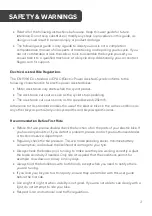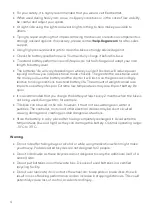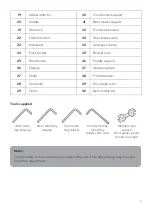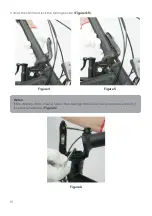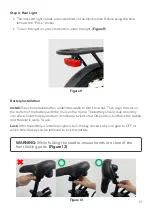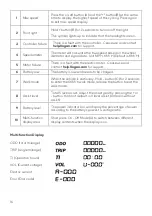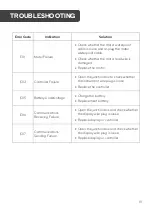
4
•
For your safety, it is highly recommended that you wear a certified helmet.
•
When used during heavy rain, snow, in slippery conditions or in the case of low visibility,
be careful and adjust your speed.
•
At night, ride using the lights and wear bright clothing to help make you visible to
others.
•
Trying to repair anything that implies removing mechanical or electrical components is
strongly advised against. If necessary, please contact
help.Kogan.com
for after-sales
support.
•
Using high pressured water jets to clean the bike is strongly advised against.
•
Check the battery level before use. You must fully charge it before first use.
•
To extend battery performance and lifespan, do not half charge and adapt your ride
length to battery level.
•
The batteries' life will vary depending on where you ride it (inclines will reduce power
rapidly) and how you ride (assistance mode chosen). The greater the assistance used,
the more you'll use the battery and the shorter it will last. Use the gears accordingly
relative to riding conditions to extend battery life. The amount of weight carried also
impacts on battery life span. Extreme low temperatures may also impact battery life
span.
•
It is recommended that you charge the battery at least every 2 months when the bike is
not being used; during winter, for example.
•
This bike can be used in the rain; however, it must not be submerged in water or
puddles. The controller, motor and other electrical devices may be short circuited,
causing damage and creating possible dangerous situations.
•
Store the battery in a dry place after having completely recharged it. Avoid extreme
temperatures (low and high) as they can damage the battery. Optimal operating range:
-10°C to 35°C.
Warning
•
Do not ride after taking drugs or alcohol or while using medication which might make
you drowsy. Pedal-assisted bicycles are not designed for 2 people.
•
Do not ride double as these bicycles are not designed to carry the additional load of a
second rider.
•
Do not put batteries in normal waste bins. Dispose of used batteries in a certified
recycling facility.
•
Do not over lubricate; if oil contacts the wheel rim, brake pads or brake disks, this will
result in loss of braking performance and an increase in stopping distances. This could
potentially cause loss of control, accidents and injury.



